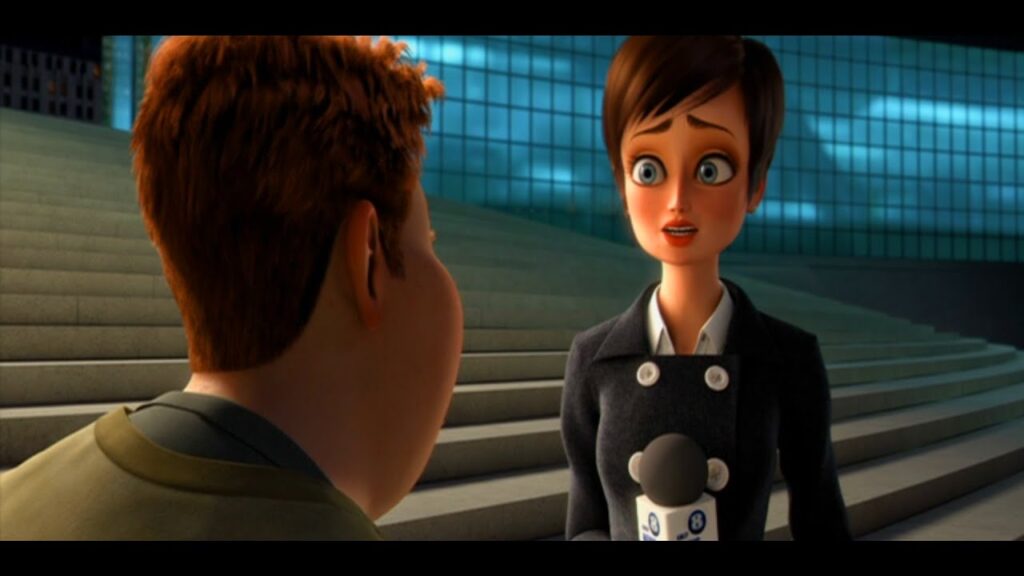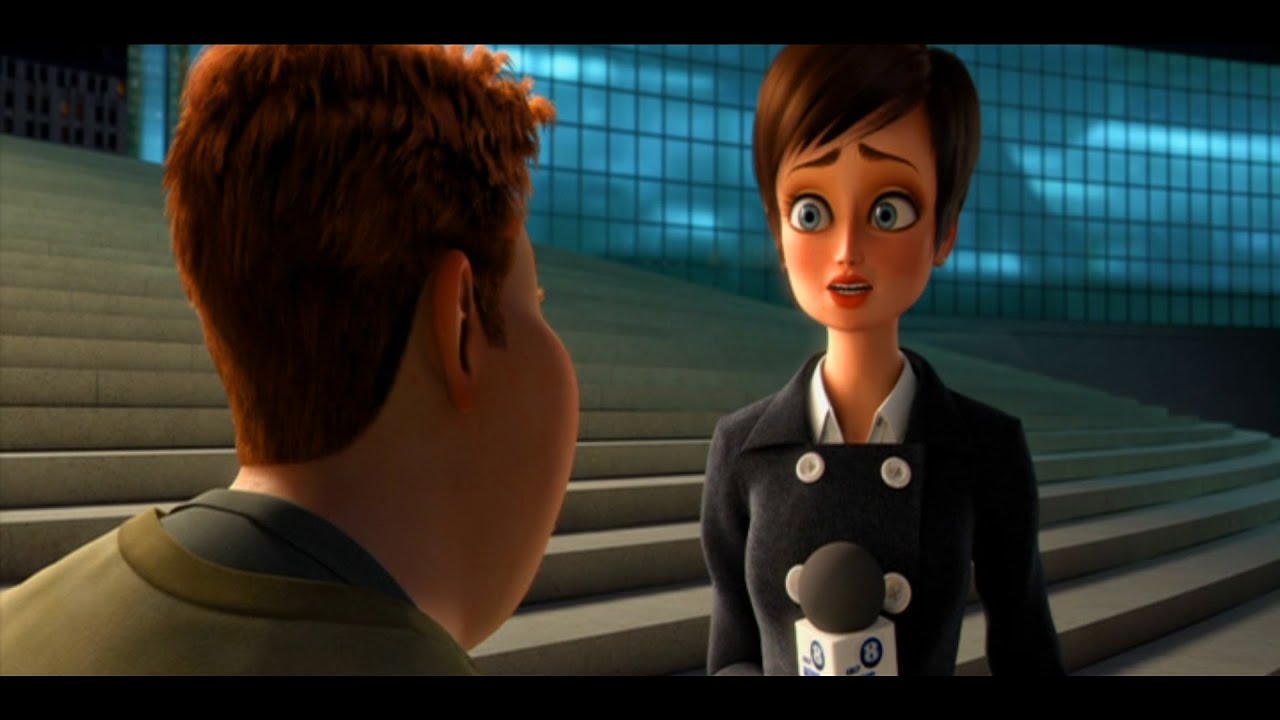
Hal Stewart: The Unlikely Origin Story of Megamind’s Nemesis, Titan
Hal Stewart, a name that might not immediately ring a bell for casual moviegoers, is the seemingly ordinary cameraman who becomes the formidable supervillain Titan in the animated film Megamind. His transformation from an awkward, lovelorn individual to a powerful and destructive force is a central element of the movie’s narrative, exploring themes of power, responsibility, and the corrupting influence of misplaced affection. This article delves into the character of Hal Stewart, examining his motivations, his evolution into Titan, and his significance within the broader context of the Megamind universe.
The Pre-Titan Hal Stewart: A Portrait of Unrequited Love
Before becoming Titan, Hal Stewart is presented as a somewhat pathetic figure. He’s a cameraman for a local news station, hopelessly infatuated with reporter Roxanne Ritchi. His feelings are, unfortunately, unrequited, and Roxanne consistently rejects his advances. This rejection, coupled with his inherent insecurities and lack of self-esteem, forms the foundation for his later descent into villainy. He is portrayed as a man who craves attention and affection, but lacks the social skills and confidence to obtain them in a healthy manner. The initial depiction of Hal Stewart is crucial for understanding why he is so easily swayed by power and why he ultimately chooses the path of destruction.
His awkwardness and lack of social grace are often played for comedic effect, but they also highlight a deeper vulnerability. He struggles to connect with others and is often the butt of jokes. This constant feeling of inadequacy contributes to his resentment and fuels his desire for validation. The unrequited love for Roxanne acts as a catalyst, pushing him further down a path where he seeks to prove himself worthy, even if it means resorting to extreme measures. He sees Roxanne as someone who can elevate him, someone who can give him the attention and love he desperately craves.
The Genesis of Titan: Gaining Superpowers and Losing Control
The turning point in Hal Stewart‘s life comes when Megamind, in his misguided attempt to create a new hero to fight, accidentally imbues Hal with superpowers using Metro Man’s DNA. This newfound power transforms Hal Stewart, both physically and mentally. He initially revels in his abilities, seeing them as a means to finally win Roxanne’s affection. However, he quickly becomes corrupted by the power, developing a narcissistic and destructive personality. The transition from Hal Stewart to Titan is not merely a physical transformation; it’s a complete shift in his moral compass.
Titan’s powers are significant, mirroring those of Metro Man, the city’s previous superhero. He possesses super strength, speed, and flight, making him a formidable opponent. However, unlike Metro Man, who dedicated his life to protecting the city, Titan uses his powers for personal gain and destruction. He becomes obsessed with proving his dominance and punishing those who he believes have wronged him, particularly Roxanne. This misuse of power highlights the film’s central theme of responsibility and the dangers of unchecked ambition. Hal Stewart, now Titan, is no longer driven by a desire for love, but by a lust for power and control.
The key difference between Metro Man and Hal Stewart lies in their values. Metro Man understood the responsibility that came with his powers, while Hal Stewart only saw them as a means to an end. This difference underscores the importance of character and the potential for even the most extraordinary abilities to be misused. The creation of Titan serves as a cautionary tale about the dangers of giving power to someone who is not emotionally or morally equipped to handle it.
Titan’s Reign of Terror: Destruction and Disappointment
As Titan, Hal Stewart unleashes chaos upon Metro City. He revels in his newfound abilities, destroying buildings and terrorizing the citizens. However, his actions are not driven by any grand scheme or ideological purpose; they are simply the result of his inflated ego and his desire to prove himself superior. He becomes a parody of a superhero, using his powers for selfish and destructive ends. This reign of terror forces Megamind to re-evaluate his own actions and to confront the consequences of his creation.
One of the most significant aspects of Titan’s reign is his continued pursuit of Roxanne. He believes that by demonstrating his power, he can finally win her over. However, his violent and destructive behavior only serves to further alienate her. Roxanne sees Titan for what he truly is: a petulant and insecure individual who is using his powers to compensate for his own inadequacies. Her rejection of Titan is a crucial moment in the film, highlighting the importance of genuine connection and the futility of trying to force someone to love you through fear or intimidation. Hal Stewart‘s transformation into Titan ultimately destroys any chance he had with Roxanne.
Titan’s actions also force Megamind to confront his own past as a villain. He realizes that he has inadvertently created an even greater threat to the city and that he must find a way to stop him. This realization marks a turning point in Megamind’s character arc, as he begins to embrace his own potential for good. The conflict between Megamind and Titan becomes a battle for the soul of Metro City, a struggle between order and chaos.
The Downfall of Titan: Megamind’s Redemption and Hal Stewart’s Defeat
The climax of the film sees Megamind facing off against Titan in a final showdown. Megamind, now embracing his newfound heroism, uses his intelligence and cunning to outsmart Titan. He exploits Titan’s weaknesses and ultimately defeats him, restoring order to Metro City. The defeat of Titan marks the culmination of Megamind’s redemption arc and the end of Hal Stewart‘s reign of terror.
The battle between Megamind and Titan is not just a physical confrontation; it’s also a clash of ideologies. Megamind represents the potential for change and the power of redemption, while Titan represents the dangers of unchecked power and the corrupting influence of ego. The victory of Megamind over Titan symbolizes the triumph of good over evil and the importance of using power responsibly. Hal Stewart‘s defeat is a direct consequence of his own choices and his inability to control his newfound abilities.
After being defeated, Hal Stewart is presumably stripped of his powers and returned to his former life as a cameraman. While his ultimate fate is not explicitly shown, it is implied that he will have to face the consequences of his actions and learn to live with the knowledge that he was once a supervillain. His story serves as a cautionary tale about the dangers of seeking power without the necessary character and responsibility. [See also: Megamind’s Transformation: From Villain to Hero] and [See also: Roxanne Ritchi: The Heart of Metro City]
Hal Stewart’s Legacy: A Cautionary Tale of Power and Responsibility
Hal Stewart‘s character serves as a powerful cautionary tale within the narrative of Megamind. His transformation into Titan highlights the dangers of unchecked power, the corrupting influence of ego, and the importance of personal responsibility. He represents the potential for even ordinary individuals to be consumed by their own desires and to misuse their abilities for selfish ends. His story underscores the need for strong moral character and a commitment to using power for the greater good.
Furthermore, Hal Stewart‘s character explores the themes of unrequited love and the search for validation. His initial desire to win Roxanne’s affection is understandable, but his methods of achieving this goal are ultimately destructive. His story serves as a reminder that true love and acceptance cannot be forced or earned through power or intimidation. Instead, they must be based on genuine connection and mutual respect. The tragic arc of Hal Stewart emphasizes the importance of self-acceptance and the need to find healthy ways to cope with rejection and insecurity.
In conclusion, Hal Stewart, the unlikely origin of Titan, is a complex and multifaceted character whose story resonates with audiences on multiple levels. His transformation from an awkward cameraman to a destructive supervillain serves as a powerful exploration of themes of power, responsibility, and the corrupting influence of misplaced affection. His character remains a significant element of the Megamind universe, offering a cautionary tale about the dangers of unchecked ambition and the importance of using power for good.

